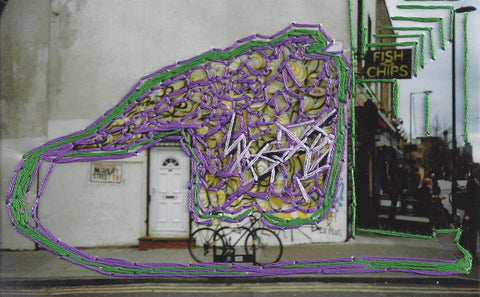‘LSD and related substances are not drugs in the usual sense, but are part of the sacred substances, which have been used for thousands of years in ritual settings… It is my great concern to separate psychedelics from the ongoing debates about drugs, and to highlight the tremendous potential inherent to these substances for self-awareness, as an adjunct in therapy, and for fundamental research into the human mind’.
This quotation is taken from a letter written by Albert Hoffman just before his death in 2008, at the time aged 101 years old. Hoffman accidentally discovered LSD in 1938 and experimented with the drug extensively throughout his life. The positivity and wonder with which Hoffman writes about the drug is quite a different perspective from what we are used to hearing from media outlets, with stories of instant psychosis, death and general bizarre happenings being the favoured stories of the press (for an extreme example, see ‘Girl Gives birth to a frog: Doctors blame LSD’, The National Examiner, 1968).[1]
So what value did Hoffman see in hallucinogenic drugs, and what value can they be for us today? Let’s have a look at how Hoffman’s vision of hallucinogens can be applied to our contemporary world, and how psychedelics can be an important tool for self exploration and change if we learn how to approach them.

Hallucinogens have been used worldwide throughout human history. Natural psychedelics include psilocybin, found in magic mushrooms, Ayahuasca, which still has an important sacred use throughout Amazonia, and mescaline, found in the peyote cactus, native to Mexico. After a psychedelic ‘revolution’ in the 1960’s, where drugs such as LSD were embraced by youth culture as a powerful tool against authority, widespread use of hallucinogens has decreased in the Western world since the banning of LSD in 1966, and psilocybin more recently in 2006.
However, psychedelics are going through somewhat of a mini-renaissance at the moment, with scientific and medical research restarting into drugs like LSD and psilocybin and their potential use for issues such as PTSD, depression and anxiety surrounding terminal illnesses.
The links between psychedelics and creativity are well established, with the drugs often being associated with musicians and artists of the 60’s, such as Jimi Hendrix and The Beatles. The colourful, intense psychedelic artistic patterns of the 60’s make a clear nod to the visions experienced during LSD or psilocybin trips. What is less known about psychedelics is their ability to increase creative thinking in a more general sense, being particularly useful for problem solving.
Psychedelics such as LSD have been proven to increase connections between different regions of the brain, which in normal states of consciousness have no connection.[2] This could be the reason why numerous inventors, artists and musicians account their insights and ideas to psychedelic experiences. Steve Jobs, for example, attributes his inspiration for inventing the personal computer to his experience with LSD, while scientist Francis Crick was on an LSD ‘microdose’ (about one twentieth of a normal dose) when he discovered the double helix structure of DNA. Jobs and Crick are examples of how psychedelics can provide invaluable creative insights, which can be missed in everyday life and thinking. According to research by the Multidisciplinary Association of Psychedelic Studies (MAPS), they can ‘significantly enhance the imagination, inspire novel thought, and strengthen problem-solving abilities’.[3]

If psychedelics are so useful for creative and insightful thinking, shouldn’t we be making the most of them? If we know tools that can enhance creative and innovative thinking, you would think or hope that we would have access to these resources, and that their use would be regulated and encouraged. Yet these drugs are highly illegal throughout the Western world, with LSD, mescaline and psilocybin all being Class A drugs. For a world in a state of somewhat ecological and economical chaos and uncertainty, new solutions to huge problems are desperately needed, and psychedelics could provide the inspiration for these. Some feel that a change in consciousness is our only hope to save the planet.
How could this work? And how does it relate to the individual and their psychedelic experience? A commonly reported experience of hallucinogenic trips is a feeling of being one small part of a larger cosmos, of being aware that you are part of something larger than yourself, and a unity with the rest of the living universe. We need only to look to the psychedelic revolution of the 1960’s, when youth culture embraced LSD as a powerful tool for a revolution of the mind. The psychedelic experience of unity with humanity and the universe encouraged the spread of the 60’s message of peace and love, and allowed a generation to stand up to and question authority, particularly regarding the senseless violence of the Vietnam War.

To go back to Hoffman’s letter: ‘Alienation from nature and the loss of the experience of being part of the living creation is the greatest tragedy of our materialistic era. It is the causative reason for ecological devastation and climate change. Therefore, I attribute absolute highest importance to consciousness change. I regard psychedelics as catalyzers for this. They are tools which are guiding our perception toward other deeper areas of our human existence, so that we again become aware of our spiritual essence. Psychedelic experiences in a safe setting can help our consciousness open up to this sensation of connection and of being one with nature.’[4]
It’s worth asking why such mind expanding drugs are so prohibited in our culture, while depressive and highly addictive drugs such as alcohol and tobacco play such a huge part in the Western world. With Hoffman’s words in mind, imagine if those in charge of the big decisions about our planet, about climate change, about war, had tried a dose of LSD or psilocybin? Would the world look the same as it does today?
References:
[1] http://dangerousminds.net/comments/girl_gives_birth_to_frog_lsd_to_blame
[2] http://beckleyfoundation.org/event/lsd-revealed/
[3] http://www.maps.org/news/multimedia-library/3171-can-psychedelic-drugs-enhance-creativity
[4] http://www.synergeticpress.com/tag/zig-zag-zen/
Artworks: Nicole Chui
Words: Amy Lockwood



